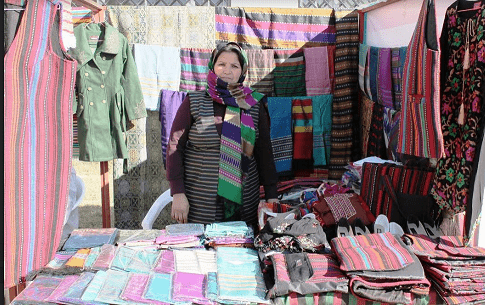KANDAHAR CITY (Pajhwok): Women in southern Kandahar province have complained about the lack market to sell their handicraft products.
They say their complaints have long been ignored and despite promises, government officials could not find proper market for women handicrafts in the country in the past 16 years.
Kandahar women’s handicrafts include designing on men’s and women’s dresses and different items for house decoration and beautification.
The craftswomen say they have made innovations in their products to match market demand, but still ther products could not be promoted.
Lemah, 35, a resident of 9th municipality district, said: “I am the mother of seven children, my husband is martyred and my two daughters design clothes and sell them in bazaar but the market is not good as it had been in the past.”
She said a good design work took her one to two months because of recent innovations but even then people did not buy them. “Handicraft is the only sources of our income,” said Lemah.
She said the overall economic decline had a negative impact on their business as well. Lemah said most designing work was performed by machines in a short span of time and it had also affected the handicraft business.
She said a machine made piece of design in the chest was accounted for 600 to 1,500 afghanis while the same design if handmade was accounted for 10,000 to 20,000 afghanis.
Zaghoona, a resident of Dand district, said shopkeepers had stopped purchasing designed pieces because they said people’s interest in them had declined. She said designing was her profession and now she was worried what to do.
“Over the past 16 years, the government has been promising an exclusive market for women’s handicrafts but despite this long period, no market was built and no good marketing activities were carried out for our products”, Zarghona complained. She said women’s handiworks were given no value and it constituted the main problem.
Zarghona said not only the market for embroidered shirts was down, other hand works by Kandahari women lacked buyers as people preferred imported items.
Rangina Hamidi, another woman, who runs a company of women handicrafts and production named ‘Kandaharai Khazani’ also held similar views.
She said her company used to give thread, cloths and other needed equipment to women who returned embroidered necks and woven women’s and children’s clothes against money. These items were then sold inside and outside of the country, she added.
However, Hamidi said the company’s activities had reduced and its hundreds of workers rendered jobless after the country’s economic situation worsened and people’s interest increased in neighboring countries’ machine works.
“Unfortunately, people give no value to domestic products and give preference to imported items and works from neighboring countries,” she said.
“Until we do not value our own products, there can be no expectation from others to buy our handicrafts,” Hamidi believed.
She said for finding market for Kandahar’s women handiwork, the government was required to lower the tax on raw materials, make more efforts for finding market for handicrafts and establish special women markets in Kandahar.
Kandahar women’s affairs deputy head, Lailoma Noori, acknowledged the Ministry of Women’s Affairs (MoWA) had repeatedly promised to establish a special market for of handicrafts of women that would be run industrialist women themselves; however, it had not happened so far.
She told Pajhwok fortunately with efforts of the Kandahar women’s affairs department, a national trader had evinced interest in allocating his business market’s one floor to women’s handicraft in Aino Mena area of Kandahar city, the provincial capital.
Noori said about 60 shops would be given to women free of rent for one year in order they sell their crafts. She said the market would be launched after Eid-ul-Adha.
On the other hand, the labor and social affairs department head, Fazal Bari Shamsi, said his department had not only set up training courses for dozens of women for flourishing handicrafts practice, but it also made efforts for finding market for them.
He as an example recalled a women’s handicrafts three-day exhibition, which was held at vocational training centre of his department in Aino Mena with the help from the Human Resources Development Agency (HRDA). The expo was aimed at familiarizing people with domestic handicrafts and products and attracting them to buy them.
Shamsi asked people to value locally produced handicrafts instead of imported items and help industrialist women that way.
nh/sns/ma
Views: 81









GET IN TOUCH
NEWSLETTER
SUGGEST A STORY
PAJHWOK MOBILE APP